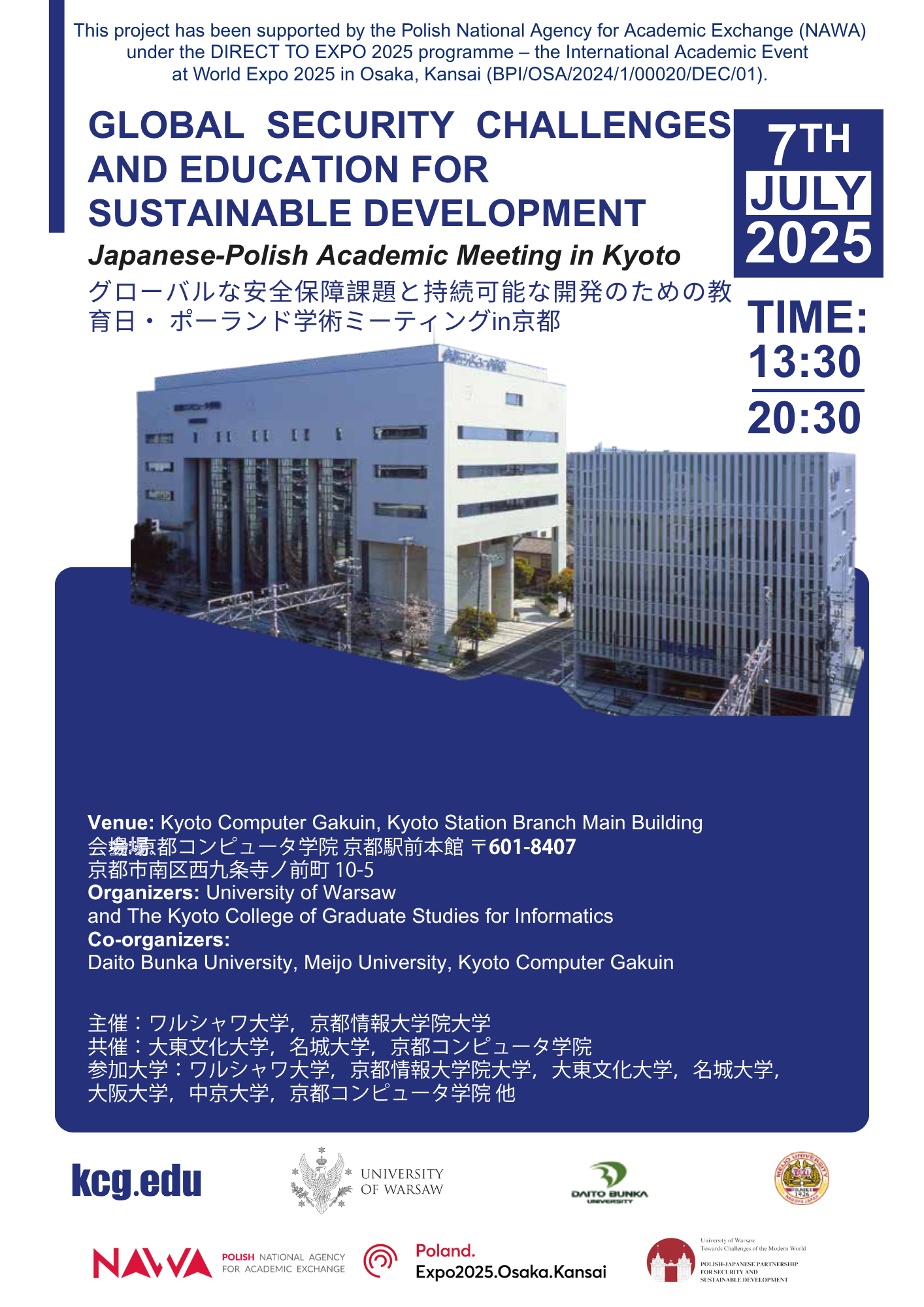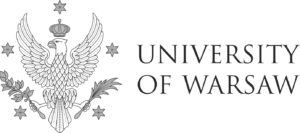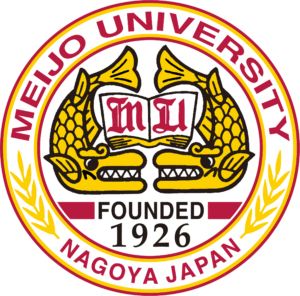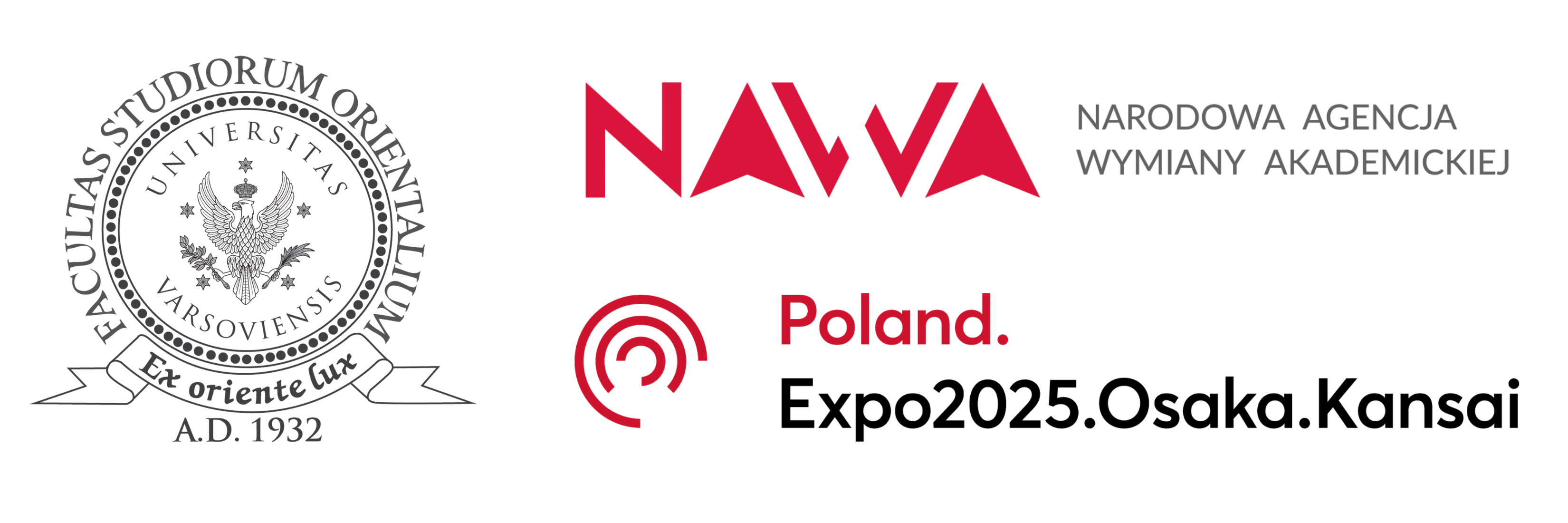7/07/2025 Japanese-Polish Academic Meeting in Kyoto

Category: Events
Japanese-Polish Academic Meeting in Kyoto
日・ポーランド学術ミーティング in 京都
Global Security Challenges
and
Education for Sustainable Development
グローバルな安全保障課題と持続可能な開発のための教育
DATE: 7/07/2025
TIME: 13:30 – 20.30
Venue: Kyoto Computer Gakuin, Kyoto Station Branch Main Building, Room E507 / E508 / Zoom
601-8407 Kyōto, Minami-ku, Nishikujō Teranomaechō 10-5
会場: 京都コンピュータ学院 京都駅前本館 〒601-8407 京都市南区西九条寺ノ前町10-5
Registration: https://forms.gle/GWvBSAc7Nbs5vXyXA
Organizers: University of Warsaw, Kyoto College of Graduate Studies for Informatics


Co-organizers: Kyoto Computer Gakuin, Daito Bunka University, Meijo University


Workshops
Human Security and Peacebuilding
ワークショップ: 人間の安全保障と平和構築
A – Disaster Management
災害対策
13.30-15.00
E507 / E508 (Zoom)
A-1: Changing Function of Rivers & Flood Risk Lowering 河川の機能の変化と洪水災害リスクの低下
Assoc. Prof. Artur MAGNUSZEWSKI, PhD Habil. アルトゥル・マグヌシェフスキ教授 (UW Faculty of Geography and Regional Studies)
Asst. Prof. Anna BATORCZAK, PhD アンナ・バトルチャク准教授 (UW University Centre for Research on Environmental Studies and Sustainable Development)
Language: English (Japanese subtitles and slides)
A-2: Society’s Response to Large-scale Disasters
Prof. TAKEDA Tomoki 武田知己教授 (Daito Bunka University Faculty of Political Science, Director of Graduate School of Law and Political Science), How should society respond to large-scale disasters? Great East Japan Earthquake and multiple natural disaster ( 大規模災害に社会はどう対応すべきか ~ 東日本大震災と多発する自然災害 ~)
Language: English
SUGIYAMA Akira 杉山央 (DBU student), 大規模災害に強い社会とは?日本の災害対応の歴史と今後の方針 (What makes a society resilient to large-scale disasters?)
NOMURA Keita 野村啓太 (DBU student) 自然災害と教育:東日本大震災の教訓をどのようにして継承していくか (Natural disasters and education: how to pass on the lessons of Fukushima)
HASUMI Koshiro 蓮見皇志郎 (DBU student), 自然災害とテクノロジー:個人での情報収集と情報発信による災害対策 (Natural disasters and technology: disaster management using drone technology)
Language: Japanese
B – Strategic Gaming in Conflict Stabilisation
紛争安定化と戦略的ゲーム
15.10-15.40
E507 / E508 (Zoom)
Language: English (Japanese subtitles and slides)
Prof. Agata DZIEWULSKA アガタ・ジェヴゥルスカ教授 (UW Centre for Europe), Peace by Piece: presentation of the simulation game
Open Seminar I: Institutional Frameworks for Sustainable Development Goals
持続可能な開発のための制度的枠組み
15.50-16.40
E507 / E508 (Zoom)
Registration: https://forms.gle/GWvBSAc7Nbs5vXyXA
Language: English, Japanese subtitles
Prof. SADOI Yuri, PhD 佐土井有里教授 (Meijo University, Dean of the Faculty of Economics), Transnational Human Resource Development for Sustainability: A Dual Perspective from Japan and Source Countries of Foreign Engineers
Asst. Prof. Anna WRÓBEL, PhD アンナ・ヴルベル准教授 (UW Faculty of Political Science and International Studies), The role of gender-aware trade policy in promoting stable, sustainable and inclusive economic growth – the case of European Union and Japan
Asst. Prof. Karina JĘDRZEJOWSKA, PhD カリナ・エンジェヨフスカ准教授 (UW Faculty of Political Science and International Studies), Challenges for financing sustainable development – European & Asian perspectives
Panel Discussion by: Dr Karolina WOJCIECHOWSKA カロリナ・ヴォイチェホフスカ准教授 (UW Faculty of Law and Administration) – Moderator & Prof. IMAI Masaharu 今井正治教授 (The Kyoto College of Graduate Studies for Informatics), Assoc. Prof. Rafał ULATOWSKI, PhD Habil. ラファウ・ウラトフスキ教授 (UW Faculty of Political Science and International Studies)
Open Seminar II: Global Security Challenges
グローバルな安全保障課題
16.50-17.40
E507 / E508 (Zoom)
Registration: https://forms.gle/GWvBSAc7Nbs5vXyXA
Language: English, Japanese subtitles
Prof. TAKAHASHI Keikichi 高橋慶吉教授 (Osaka University, Graduate School of Law and Politics), Unprecedented threats for Japan and the World: North Korea, China, and the United States
Assoc. Prof. Łukasz ZAMĘCKI, PhD Habil. ウカシ・ザメンツキ教授 (Faculty of Political Science and International Studies UW), Democracy under siege: The global security implications of authoritarian resurgence and disinformation warfare
Panel Discussion by: Prof. Maciej RAŚ マチェイ・ラシ教授 (UW Vice-Rector, Faculty of Political Science and International Studies) – Moderator & Assoc. Prof. Katarzyna NAWROT, PhD Habil. カタジナ・ナヴロット教授 (UW Faculty of Political Science and International Studies), Assoc. Prof. Józef PAWŁOWSKI, PhD Habil. ユゼフ・パヴオフスキ教授(UW Vice-Dean of Faculty of Oriental Studies, Sinology Department), Prof. TAKEDA Tomoki 武田知己教授 (Daito Bunka University, Faculty of Law), Assoc. Prof. YAJIMA Akira 矢嶋光准教授 (Meijo University, Faculty of Law)
Open Seminar III: Education, Science Policy & Research Assessment
教育・科学政策・研究評価 ~異なる社会文化システムの視点から~
17.50-18.40
E507 / E508 (Zoom)
Registration: https://forms.gle/GWvBSAc7Nbs5vXyXA
Language: English, Japanese subtitles
This panel discusses education, science policy, and research assessment in different sociocultural systems in shaping knowledge-based societies. It will examine how national and international policies influence educational systems, the direction of scientific research, and the evaluation of academic output. Particular attention will be given to challenges such as balancing excellence with inclusivity, aligning assessment methods with long-term societal goals, and fostering innovation in educational practices. Panelists will examine variations in research evaluation methods, funding priorities, and the role of education in national innovation strategies. The discussion will highlight both common challenges and unique approaches, offering insights into how localized practices can inform global debates on quality, equity, and impact of science and education policy. The panel encourages cross-cultural dialogue and knowledge exchange to foster inclusive and effective policy design.
Prof. Zygmunt LALAKジグムント・ララク教授 (UW Vice-Rector for Research), Strategic directions of science policy of Polish higher education institutions on the example of the University of Warsaw
Assoc. Prof. Katarzyna NAWROT, PhD Habil. カタジナ・ナヴロット教授 (UW Faculty of Political Science and International Studies), Advancing research assessment policy – European perspective
Science policy and research assessment in Asia – Japanese perspective
Panel Discussion by: Prof. Ewa KROGULEC エヴァ・クログレツ教授 (UW Vice-Rector for Development) – Moderator & Prof. Maciej RAŚ マチェイ・ラシ教授 (UW Vice-Rector for Student Affairs and Quality of Teaching and Learning), Assoc. Prof. Łukasz ZAMĘCKI, PhD Habil. ウカシ・ザメンツキ教授 (UW Faculty of Political Science and International Studies)
Open Lectures: Education for Sustainable Development
持続可能な開発のための教育
19.00-20.30
6th Floor Lecture Hall
Registration: https://forms.gle/GWvBSAc7Nbs5vXyXA
Language: English (slides in Japanese), Japanese subtitles
19.00-19.10
開会挨拶 Opening remarks
Vice-President of The Kyoto College of Graduate Studies for Informatics, Prof. EIHO Shigeru 京都情報大学院大学副学長 英保茂教授
UW Vice-Rector for Research, Prof. Zygmunt LALAK ジグムント・ララク教授
19:10-19.35
Prof. Marcin ZYCH (UW Faculty of Biology, Director of the UW Botanic Garden), Public outreach and biodiversity crisis: lessons from the Polish botanic gardens
マルチン・ゼィフ教授(ワルシャワ大学大学生物学部, ワルシャワ大学植物園園長)パブリック・アウトリーチと生物多様性の危機:ポーランドの植物園からの教訓
Botanic gardens are institutions with a very long history. Currently, in response to the challenges and threats of the modern world and the needs of their visitors, botanic gardens are becoming multifunctional units, combining scientific, conservation, educational, exhibition and recreational functions. Worldwide, botanic gardens host over 0.5 billion visitors per year and their collections contain about 1/3 of the global flora, maintained and studied by the group of specialists that includes scientists, educators and practitioners-gardeners dealing with plants. In the face of the growing threat to biodiversity, these resources and competences make botanic gardens key players in effective nature conservation which, among all, includes public outreach to convince the society of the great importance of plants through appropriate educational activities. This is perfectly illustrated by the example of Polish gardens which, thanks to their extensive activities, find the right compromise between the burning need to catalogue and protect the biodiversity of plants, and meeting the social demand for information and services.
19.35-19.50
Dr Justyna GODLEWSKA-SZYRKOWA (UW Faculty of Political Science and International Studies, Vice-Dean of the UW Faculty of Medicine), Academic Education in the AI Era: skills that matter
ユスティナ・ゴドレフスカ=シルコヴァ准教授(ワルシャワ大学政治学・国際研究学部, ワルシャワ大学医学部副学部長), AI時代の学術教育: 重要なスキルの獲得
The accelerating impact of artificial intelligence and the digital transformation is challenging traditional university education and its role in society. The social changes that are taking place are forcing a reevaluation of the aims and tools of education, questioning in many respects the previous curricula, the profiles of graduates, and the relevance of a university degree in the labour market. Universities need to redefine their role, and social responsibility, in an age of digital revolution. One approach that can be applied is to look through the lens of the key competences that are necessary in a digital society. Seen from this perspective, the overarching role of the university in the field of education is, first and foremost, to foster the formation of advanced cognitive competences in individual fields of study, and to aid the development of social skills (cooperation, communication, conflict resolution) and self-regulation skills (emotional intelligence, resilience, self-management). The aim of education would therefore also be to ensure lifelong learning and to engender an attitude geared towards the flexible acquisition of new competences and the abandonment of unsuccessful patterns.
19.50-20.05
Dr. Sebastian SZYMAŃSKI (UW Faculty of „Artes Liberales”, Director of the Centre for Systemic Risk Analysis), Human Agency and the Development of AI: threat or challenge
セバスチャン・シマンスキ准教授 (ワルシャワ大学システミックリスク研究センター長) 人間の主体性とAIの発展:脅威か課題か
The rapid advancement of artificial intelligence (AI) technologies has sparked profound discussions about their implications for human agency. While AI systems are increasingly capable of performing tasks traditionally reserved for humans – ranging from decision-making to creative endeavors – the question arises: does this development threaten human autonomy, or does it present an opportunity to redefine and enhance our role in the digital age? This presentation explores the dual nature of AI’s impact on human agency, focusing on its potential to either diminish or augment human control over key aspects of life. On the one hand, AI systems can erode agency by automating decisions, reinforcing biases, and concentrating power in the hands of a few stakeholders. On the other hand, these technologies offer unprecedented opportunities to amplify human creativity, empower underrepresented voices, and solve complex global challenges. Drawing on interdisciplinary perspectives from philosophy, ethics, and technology studies, the talk examines how humans can retain control over AI’s trajectory while ensuring it aligns with societal values. By emphasizing the role of transparent governance, inclusive design, and ethical oversight, it highlights strategies to mitigate risks and maximize benefits. Ultimately, the development of AI is not a predetermined threat but a challenge that demands thoughtful, collective action to preserve human agency in the face of rapid technological evolution.
20.05-20.30 Prof. Szymon MALINOWSKI (UW, Director of the Institute of Geophysics), Sky isn’t that far, Earth is smaller than you think”. Teaching the climate crisis – the perspective of an academic teacher and science populariser
シモン・マリノフスキ教授(ワルシャワ大学物理学部; ポーランド科学アカデミー気候危機諮問委員会委員長)
「空はそんなに遠くない、地球はあなたが思っているより小さい」:気候危機を教える ~ 教師と科学普及者の視点
Atmosphere, if compressed to the density of water would be 10 m deep. This means that we are not far from the outer space and only some properties of the atmosphere allowed life to develop and us to exist. Recently mass of all human products existing on earth is greater that mass of all biosphere. We govern the surface of our planet, we govern climate, water cycle, cycling of nutrients, we govern life on our planet. Are we aware of it?
This project has been supported by the Polish National Agency for Academic Exchange (NAWA) under the DIRECT TO EXPO 2025 programme – the International Academic Event at World Expo 2025 in Osaka, Kansai (BPI/OSA/2024/1/00020/DEC/01).
